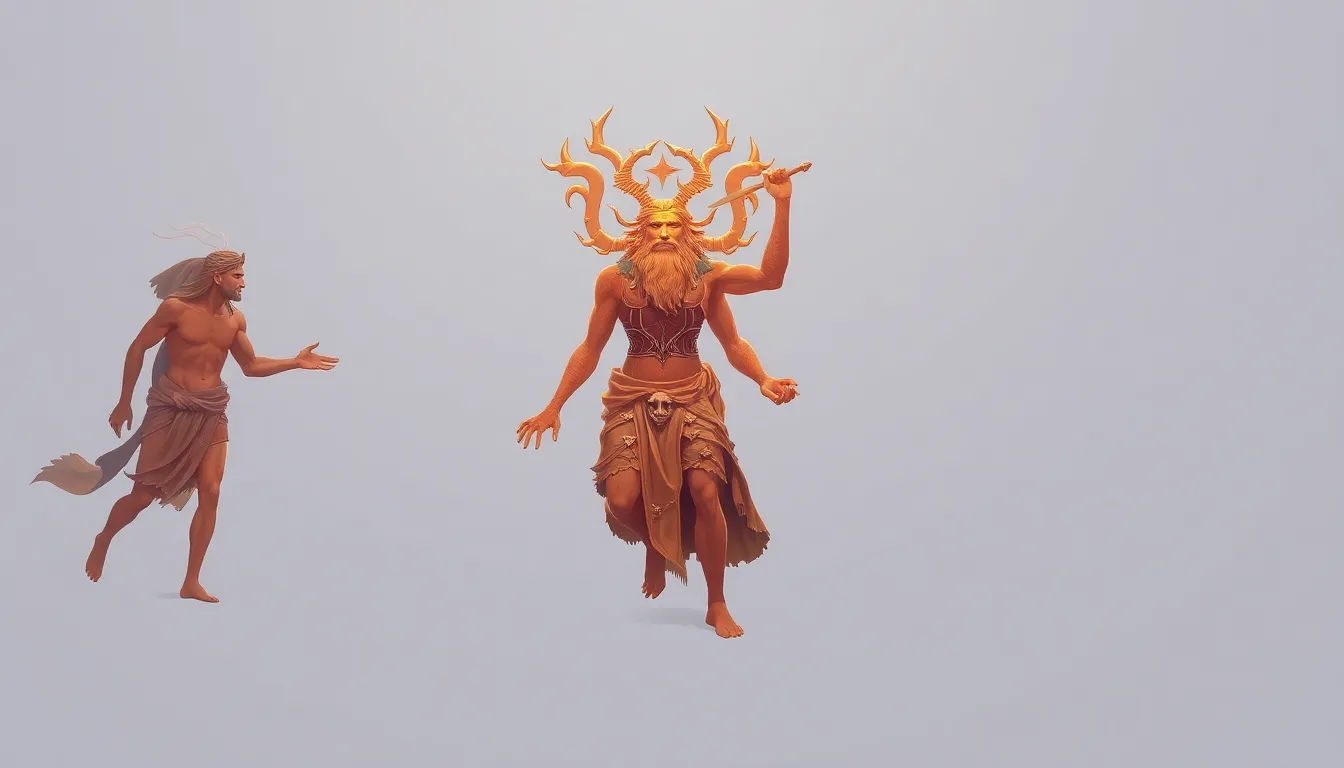The Role of the Primordial Deities in Greek Creation Myths
I. Introduction
In Greek mythology, primordial deities are the first entities that emerged at the dawn of creation, forming the foundation of the universe as we know it. These ancient beings represent fundamental aspects of existence and are crucial to understanding the complexities of Greek cosmology. Creation myths, which often feature these primordial deities, offer insight into how the ancient Greeks viewed the world, the origins of life, and the relationships between different elements of nature.
This article will delve into the primordial deities, exploring their roles in creation myths and their significance within the broader Greek pantheon. We will examine key figures such as Chaos, Gaia, Tartarus, and Eros and how their interactions shaped the cosmos and influenced later generations of gods and mortals.
II. Overview of Primordial Deities
Primordial deities are among the earliest beings in Greek mythology, representing the essential elements of the universe. Here are some key figures:
- Chaos: The void or abyss from which everything originated.
- Gaia: The Earth Mother, personifying the earth and life.
- Tartarus: The abyss deep beneath the earth, often associated with the underworld.
- Eros: The god of love, representing a fundamental creative force.
Each of these deities carries unique characteristics and attributes that contribute to their significance in the Greek pantheon. They embody powerful concepts and forces that govern the universe, affecting not only their own existence but also the lives of later gods and mortals.
III. The Concept of Chaos: The Beginning of All Things
Chaos is often depicted as the primordial void, an empty and formless state that existed before creation. In many accounts, Chaos is described as a vast abyss, a limitless expanse that housed potentiality and the building blocks of existence.
Chaos played a crucial role in initiating the creation process. From this void emerged the first beings, including Gaia and Tartarus, setting into motion the cosmic events that would lead to the formation of the earth, sky, and all life within it. Mythological interpretations surrounding Chaos vary, but it is predominantly viewed as a necessary precursor to order and structure. Without Chaos, there would be no creation, as it represents the untapped potential from which all things arise.
IV. Gaia: The Earth Mother
Gaia, personifying the Earth, emerged from Chaos and became one of the most revered primordial deities. She is often depicted as a nurturing mother, representing fertility and the natural world. Her emergence symbolizes the birth of the physical realm.
Gaia played a vital role in the creation of the earth and all living things. From her, various deities and creatures were born, including:
- Uranus (the Sky)
- Mountains
- Sea (Oceanus)
- Various Titans, such as Cronus and Rhea
Gaia’s relationships with other deities and her offspring shaped the future of Greek mythology. For instance, her union with Uranus resulted in the creation of the Titans, who would later play significant roles in the myths surrounding the Olympian gods.
V. Tartarus: The Abyss and Its Significance
Tartarus is defined as a deep abyss, a place of punishment and confinement located beneath the earth. In Greek mythology, it is often depicted as a gloomy and terrifying realm, where the wicked face eternal torment.
Tartarus holds a unique position in the mythological landscape, serving as a counterpart to Gaia. While Gaia represents life and nurturing, Tartarus embodies darkness and punishment. Its connection to creation lies in its role as a place of contrast, emphasizing the duality of existence.
The significance of Tartarus is further highlighted by its association with the Titans, who were imprisoned there after their defeat by the Olympian gods. This aspect of Tartarus contributes to the rich tapestry of Greek mythology, illustrating the struggle between order and chaos, light and darkness.
VI. Eros: The God of Love and Creation
Eros, often recognized as the god of love, is another primordial deity crucial to the Greek creation narrative. According to some myths, Eros emerged from Chaos alongside Gaia and Tartarus, representing the fundamental force that binds the cosmos together.
The concept of love as a creative force is deeply rooted in Greek mythology. Eros symbolizes not only romantic love but also the generative aspect of love that fosters creation and growth. His influence is seen in the formation of relationships among deities, the birth of new beings, and the development of the universe.
Eros’s role in the creation narrative emphasizes the interconnectedness of love and existence, suggesting that creation itself is an act of love.
VII. Interactions and Relationships Among Primordial Deities
The relationships and dynamics among the primordial deities are intricate and significant. These interactions influenced the creation and evolution of subsequent generations of gods and other creatures. For example:
- Gaia and Uranus’s union produced the Titans, who would later become central figures in Greek mythology.
- Eros’s presence among the primordial deities highlights the importance of love in fostering relationships and creation.
- The contrast between Gaia and Tartarus illustrates the balance between life and death, creation and destruction.
The impact of primordial deities extends beyond their own narratives; they laid the groundwork for the Olympian gods and the myths that would follow. Their stories are woven into the cultural fabric of ancient Greece, influencing literature, art, and philosophy.
VIII. Conclusion
In summary, the primordial deities play a fundamental role in Greek creation myths, serving as the architects of the universe and the foundations upon which later narratives are built. Figures like Chaos, Gaia, Tartarus, and Eros are not just characters in myths; they represent essential concepts that shaped ancient Greek beliefs about existence, life, and the cosmos.
The lasting influence of these primordial deities in Greek mythology is a testament to their importance in understanding the ancient worldview. By studying these figures, we gain deeper insight into the complexities of Greek cosmology and the cultural significance of their creation myths in the broader context of ancient beliefs.




